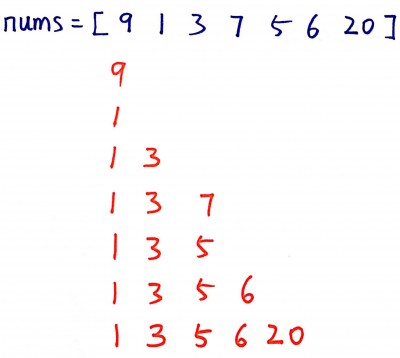Given an unsorted array of integers, find the length of longest increasing subsequence.
For example, given [10, 9, 2, 5, 3, 7, 101, 18], the longest increasing subsequence is [2, 3, 7, 101]. Therefore the length is 4.
Java Solution 1 – Naive
Let max[i] represent the length of the longest increasing subsequence so far.
If any element before i is smaller than nums[i], then max[i] = max(max[i], max[j]+1).
Here is an example:

public int lengthOfLIS(int[] nums) { if(nums==null || nums.length==0) return 0; int[] max = new int[nums.length]; Arrays.fill(max, 1); int result = 1; for(int i=0; i<nums.length; i++){ for(int j=0; j<i; j++){ if(nums[i]>nums[j]){ max[i]= Math.max(max[i], max[j]+1); } } result = Math.max(max[i], result); } return result; } |
Java Solution 2 – Binary Search
We can put the increasing sequence in a list.
for each num in nums
if(list.size()==0)
add num to list
else if(num > last element in list)
add num to list
else
replace the element in the list which is the smallest but bigger than num

public int lengthOfLIS(int[] nums) { if(nums==null || nums.length==0) return 0; ArrayList<Integer> list = new ArrayList<>(); for(int num: nums){ if(list.size()==0 || num>list.get(list.size()-1)){ list.add(num); }else{ int i=0; int j=list.size()-1; while(i<j){ int mid = (i+j)/2; if(list.get(mid) < num){ i=mid+1; }else{ j=mid; } } list.set(j, num); } } return list.size(); } |
Note that the problem asks the length of the sequence, not the sequence itself.
The binary search solution can also be simplified by using Arrays.binarySearch() method.
public int lengthOfLIS(int[] nums) { int[] dp = new int[nums.length]; int len = 0; // len of sequence for(int num: nums){ int idx = Arrays.binarySearch(dp, 0, len, num); //if not found, return binarySearch return -insertPosition-1 if(idx < 0){ idx = - (idx + 1); } dp[idx] = num; //update len when insert position is at the end if(idx==len){ len++; } } return len; } |
the binary search method is wrong .
As it is violating the insertion order ie if a small element is appearing after the larger element, then also it will be adding that element as a part of the LIS
The 1 2 3 10 is just an intermediate result, it it not the longest sub sequence.
For input 1,2,3,7,8,4 it replaces 7 with 4 and list is 1,2,3,4,8 which is wrong. Need to alter logic.
why not use stack for nlogn solution?
the solution 2 is not correct.
data:
[ 9, 1, 3, 7, 8, 9, 5, 6, 20]
output
1,3,5,6,9,20
It should be
1,3,7,8,9,20
It’s asking for the longest sequence count, Not the actual longest sequence. The longest sequence is 4. If they where asking to print out the longest sequence, you would be correct. In that case, you would also handle the case when there two sequence with the same length.
The binary search program fails for input 1 4 9 10 2 3
Output produced is 1 2 3 10 which id definitely not longest increasing.